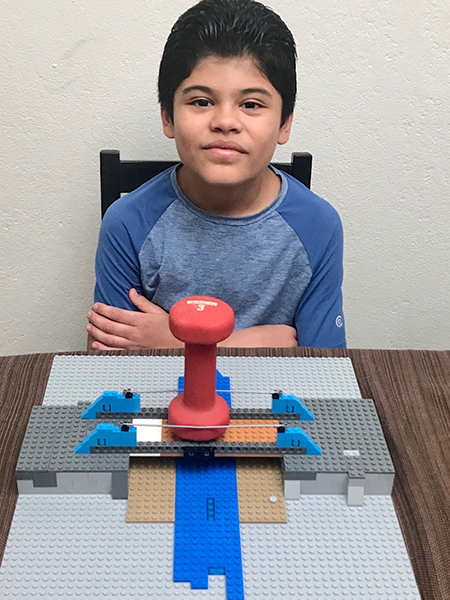Nevada 4-H offering late summer and fall activities
Extension aims to keep youth engaged and learning despite COVID-19 restrictions
By Claudene Wharton
4-H youth have been encouraged to make videos or take photos at home to share with others, like this one from the “Dog Den” of 4-H in Pahrump, featuring Anoushka (left back), Alaina (right back) and Increase (front center).
Despite the COVID-19 pandemic, the Nevada 4-H Youth Development Program has developed a variety of activities to continue to engage 4-H youth throughout the state as the school year begins and fall draws near.
“People are accustomed to us kicking off various 4-H programs around the beginning of the traditional school year, and despite COVID-19, we are still getting a lot of inquiries about afterschool programs, as well as clubs and other 4-H activities,” explained Carrie Stark, Nevada 4-H program director with University of Nevada, Reno Extension. “Our staff and volunteers are working incredibly hard to constantly build and adapt programs to serve our youth, as COVID-related restrictions are a bouncing ball, changing regularly.”
Stark said that there are a number of statewide and local programs that will be offered. Staff and volunteers are making plans to deliver them either in person, virtually or as a hybrid of the two, depending on local restrictions and health conditions at the time the programs are offered. All programs and events will strictly adhere to COVID-19 restrictions in place at that time.
Several local 4-H programs will still be offering 4-H afterschool STEM programs, at schools, Extension facilities and various other locations if in person. And, many 4-H clubs are still planning meetings and activities, whether in person or virtually. There are also at least a couple of camps planned so far: a 4-H Mindfulness Camp for ages 13 to 19, Oct. 5-9, at the State 4-H Camp in South Lake Tahoe if in person; and a 4-H Fall Break STEAM Camp for ages 5 to 12, Oct. 6-9, at the Women and Children’s Center of the Sierras in Reno if in person.
In addition, there are several statewide activities and programs being offered, or in the works. All participants should strictly adhere to current COVID-19 restrictions. Offerings include:
Thoughtful Thursdays (Every other Thursday)
These are 5- to 10-minute videos by Nevada 4-H professionals on timely topics such as communicating feelings, financial management for youth, and civic engagement and service to community ideas. They are pre-recorded and posted on social media.
4-H True Leaders to Service Month (September)
Nevada 4‑H youth will be pledging to give service to their communities during September, as part of the Nevada 4-H True Leaders in Service Initiative. The initiative is not only a way for 4-H youth to keep active and engaged in positive activities, it’s also a way for all 4‑H members to say “thank you” to their communities, counties and state for the support they have provided to 4‑H for over 100 years. Participants are encouraged to find creative ways to provide service to their communities.
Virtual Clover Challenge 4K Fundraiser for the State 4-H Camp (Sept. 13-26)
Participants will use a fitness tracker, smart phone or good old-fashioned stopwatch to clock how long it takes them to complete this 2.5-mile challenge. They can run, walk, rollerblade, skateboard, mountain bike, skip around the neighborhood, hike a favorite trail, or do any 2.5-mile physical activity they can safely complete. The registration fee, which includes a t-shirt is $35, and participants can compete as an individual or family. Proceeds support the State 4-H Camp at South Lake Tahoe, which, as a result of COVID-19 restrictions this summer, was not able to generate revenue needed to adequately maintain the facility and grounds.
 During June, Nevada 4-H challenged youth ages 9 to 11 to participate at home in the Nevada 4-H STEM Build Challenge, building several different things, one being a bridge that would hold something heavy. Henry shows off his bridge here.
During June, Nevada 4-H challenged youth ages 9 to 11 to participate at home in the Nevada 4-H STEM Build Challenge, building several different things, one being a bridge that would hold something heavy. Henry shows off his bridge here.State 4-H Expo (September – October)
State 4-H Expo activities will still be held, either entirely virtually, or some local in-person as well, depending on COVD-19 restrictions at the time. Contests and events will include static exhibits, animal shows (livestock breeding, rabbit, poultry, dog and horse), communication demonstrations and speeches, shooting sports, and STEM challenges. The events will take place throughout September and October, with a final virtual awards ceremony at 3 p.m., Oct. 17, to celebrate all of the participants’ hard work.
National 4-H Week (Oct. 4-10)
For over 100 years, 4‑H has inspired families, shaped careers, helped develop future leaders and impacted communities. Nevada 4-H youth, alumni and volunteers will join others across the country to celebrate the impact of 4‑H. Specific activities will be planned and announced as the week draws nearer.
4-H Discover Your Future-Career Awareness Webinar Series (Thursdays, Oct. 29 – Dec. 17)
Youth, ages 13 to 19 will learn about different careers needed in our state, including engineers, farmers and ranchers, architects, veterinarians, conservation officers and biologists, firefighters and more, from individuals who are currently in the field. Youth will have the opportunity to interact with presenters and ask questions. Registration information will be available in September.
For more information on Nevada 4-H’s school-year and fall programs for youth, go to the Nevada 4-H website; contact the local University of Nevada, Reno Extension office; or, in northern Nevada email sarahc@unr.edu, and in southern Nevada email lunan@unr.edu.


